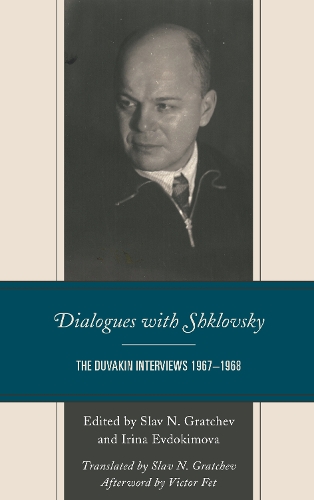
Dialogues with Shklovsky: The Duvakin Interviews 19671968
(Hardback)
Publishing Details
Dialogues with Shklovsky: The Duvakin Interviews 19671968
By (Author) Slav N. Gratchev
Edited by Irina Evdokimova
Translated by Slav N. Gratchev
Afterword by Victor Fet
Contributions by Alexey Lobov
Bloomsbury Publishing PLC
Lexington Books
10th April 2019
United States
Classifications
Professional and Scholarly
Non Fiction
Anthologies
801.95092
Physical Properties
Hardback
158
Width 160mm, Height 230mm, Spine 17mm
445g
Description
This book reflects the spirit of timeswhen the most dramatic events of the 20th century were happening in Russia and the USSR. A transcription and translation of a 1967-68 interview with the founder of the Formalist School of literary theory, Viktor Shklovsky, this volume offers a slice of Russian micro-history, like the contributions of Italian historian Carlo Ginzburg but even more trustworthy because it relies on the living voice of that history. Through the transcription of a six-hour phono-document, the readers hear the voice of a real participant in events that for the longest time in the USSR were forbidden to discuss or write about. Shklovsky, besides being a well-known and brilliant literary theorist, was a friend and interlocutor of many famous people whose lives and deaths, up to these days, remain a mystery to us. Through these informal dialogues that are not constrained by censorship or fear, we will be able to shed some more light on the real characters, instincts, habits, and views of those people. By listening to these dialogues, readers will see the reflection of history in the eyes of a real witness who, in most cases, was just a good fellow citizen and suffered during those times, like thousands of others.
Reviews
What did Khlebnikov make of Mandelstam's poetry; why did Shklovsky consider 'Doctor Zhivago' an unremarkable novel; and how were Mayakovsky and Blok involved with Russian Formalism If you want to know the answers, read Duvakin's quirky interviews with Victor Shklovsky: a treasure trove of knowledge and vivid impressions of post-1917 Russian culture. -- Galin Tihanov, George Steiner Professor of Comparative Literature, Queen Mary University of London
I knew almost everyone, Viktor Shklovsky told his interviewer in 1968. He certainly did. A major contributor to the history and theory of art and literature in Russia, Shklovsky was at the center of the avant-garde movement of the 1910s-1920s, and his warning Do not forget that we were all crazy at that time captures well the hopes, the aspirations, and the audacity of early Soviet writers, poets, and artists. Witty and opinionated, these interviews bring the reader into the midst of the exciting and eccentric milieu of those who had energy and talent to envision a world of art that never existed before. Accompanied by detailed commentaries, this collection is a great addition to the history of Russian culture of the twentieth century. -- Serguei Oushakine, Princeton University
Author Bio
Slav N. Gratchev is associate professor of Spanish at Marshall University. Irina Evdokimova is an independent scholar and former attorney.
